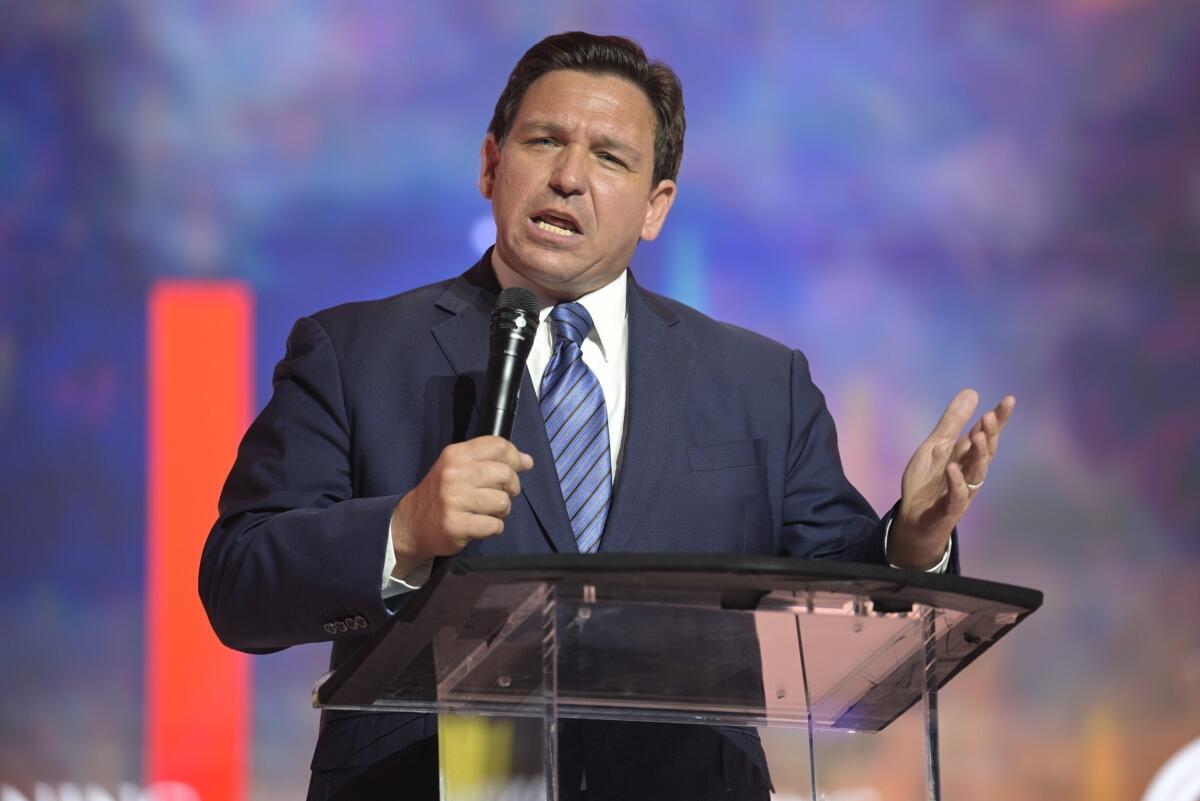Column: The ‘election police’ don’t need to be right to be effective

- Share via
Last December, Richard Molina was ousted as mayor of Edinburg, Texas.
Why should you care? Because what happened to Molina in Edinburg could be coming to a town near you. Our cautionary tale begins where many of our recent scary stories begin: the 2016 general election.
As you may recall, President Trump chirped about “voter fraud” for months after his inauguration because he couldn’t handle the fact he had lost the popular vote to Hillary Clinton. In an attempt to validate his unsubstantiated claims that millions had voted illegally, in May 2017 Trump established the Advisory Commission on Election Integrity. He asked the Republican-led, 11-member committee to find proof of the widespread corruption that didn’t exist.
Opinion Columnist
LZ Granderson
LZ Granderson writes about culture, politics, sports and navigating life in America.
Of course nothing was found.
But down in Texas, something was started.
Footage from police officers’ body cameras in Florida has troubled the nation in recent weeks by showing Gov. Ron DeSantis’ election police harassing people for voting. But it wasn’t DeSantis who came up with this latest incarnation of “election police,” and it didn’t start this year.
Back in 2018, the Lone Star State — and its eager-to-please attorney general, Ken Paxton — used Trump’s lies about 2016 to justify creating a voter fraud unit. Some saw the move as Paxton positioning himself to replace the embattled Jeff Sessions as Trump’s attorney general. Others wondered whether he was seeking a presidential pardon because he had been indicted. Regardless of why Paxton started the fraud unit, it’s how he has used it that’s disturbing.
An ACLU analysis found in 2021 that more than 70% of the voter fraud cases out of Paxton’s office had targeted Black and Latino voters. When Paxton heard of Hervis Rogers, a 60-something Black man who stood in line for more than six hours to vote in 2020, the state attorney general had him arrested for voter fraud. The primary was in March, but Rogers’ parole didn’t end until June. He said he didn’t know he was violating parole by voting.
The maximum sentence for that offense is 20 years in Texas. Given Rogers’ age, that could have meant life in prison.
You want to know what kind of person Paxton is? That tells you everything you need to know.
Rogers’ arrest looks a lot like what’s happening in Florida, where many of the people arrested for fraud had been told by the state that they could vote. Last week a district court judge tossed out the case against Rogers, saying the attorney general had overreached. I hope those Floridians receive similar justice.
I also hope the chilling nature of the video puts an end to this farce.
A year ago Paxton spent $2 million to close just three cases. On Monday, he announced a new “2022 General Election Integrity Team” staffed with lawyers and investigators — investing more resources on a problem he knows does not exist.
Kris Kobach, a candidate for attorney general in Kansas, was vice chair of Trump’s 2017 voter fraud commission that found nothing — and he still claims there’s mass voter fraud. Earlier this year Republicans floated the idea of similar fraud police units in Georgia and Arizona despite the two states having conducted multiple, high-profile recounts that only disprove the case for mass voter fraud.
But much like the wave of conservative bills targeting critical race theory and transgender children, the voter fraud conversation was never based on the facts. Just fear and political calculation.
Which brings us to Edinburg.
Molina was elected mayor of this South Texas town in 2017. He was arrested in 2019, accused of bribery and telling voters they could change their addresses to vote in an upcoming election. He was acquitted this August but by then had already lost credibility and his bid for reelection.
Here’s a man who was born in Edinburg, worked as a police officer there and served on the City Council, and now his career has been upended by a voter fraud unit that was born out of lies.
I don’t know whether he was a good mayor. I don’t know if he would have won reelection had he and his wife, who is still awaiting trial, not been ensnared in Paxton’s pet project. What I do know is that the night of the Edinburg election last year, the incoming mayor, Ramiro Garza Jr., told a reporter he wanted to “build back trust in our city government.”
It’s impossible to extrapolate how much of a role Molina’s arrest played in the outcome, but judging from Gaza’s comments, voters in the community viewed it as one. And that is the hidden danger lurking in the shadows. Unscrupulous fraud arrests could interrupt registration drives and campaign meetings, damage reputations, derail fundraisers or impact election outcomes all under the guise of law and order.
No wonder 2020 election deniers are calling for more.
More to Read
A cure for the common opinion
Get thought-provoking perspectives with our weekly newsletter.
You may occasionally receive promotional content from the Los Angeles Times.












